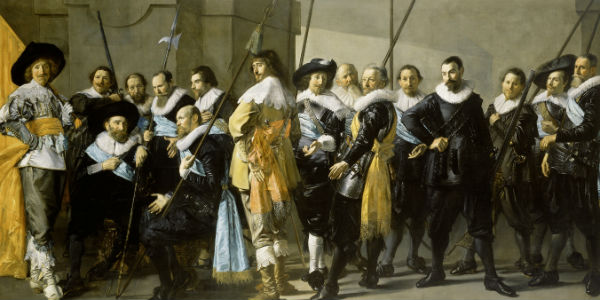Shooting for freedom: what guns teach us about US political culture
The right to bear arms is a fundamental tenet of freedom for many Americans. But it is often met with incomprehension in the UK and Europe. Dylan McLean unpicks the origins of America’s gun culture, tracing it back to the militia in Tudor society, and explains how firearms are associated with personal freedom and the power of an individual to resist the elite. In turn, aspects of US politics – for example, the lack of a successful social democratic party – mark out the country’s individualistic culture.

Militia originated in Europe. The militia company of District XI under the command of Captain Reynier Reael, known as ‘The Meagre Company’, by Frans Hals and Pieter Codde, 1637. From the Rijksmuseum, Netherlands. Public domain
Nowadays, Britain and the United States are close allies with a special diplomatic relationship. But it is sometimes worth remembering that this special relationship is the product of a nasty divorce. The founding circumstances of the US help explain some important contrasts between the two countries, as well as the other British settler colonies that gained independence without revolt. This is especially the case when it comes to the very instruments of revolt: guns. Arms facilitated the Anglo-American divorce so long ago, and they stubbornly remain a point of marked cultural and political contrast today.
According to the political scientist Louis Hartz, when the Americans revolted in the 18th century they amplified and cemented the liberal middle-class ethic taken from the declining Tudor polity in the 17th century into a unique Americanism. Hartz, in The Founding of New Societies, writes that,
…the Americans in a national revolt, in a new constitutional document, enunciated the liberal ethic in the course of a revolt for independence facilitated peculiarly the conversion of the ethic into nationalism. Here is one of the sources of that peculiarly driving “Americanism” that the other bourgeois fragments lack: Jefferson in the Declaration articulates the spirit of both the American migration and the American Revolution, the latter sharpening the nationalist significance of the former…The American troops lay down their lives for an idea embodied in a country…for a country embodied in an idea (1964, p. 81).
In Continental Divide, S.M. Lipset describes the resulting Americanism as one that emphasises individual liberty, anti-statism, meritocratic egalitarianism, and populism. American political culture, this Americanism, determines the outer limits of political debate, defines the centre and distinguishes the US from the rest of the world.
In an article in Commonwealth and Comparative Politics, I briefly survey the gun control policies and cultures of the US, UK, and several other English-speaking democracies. The US is an exceptional outlier in every respect. There are more guns in private hands in the US – indeed, enough to equip every member of the populace with one – than there are in any other country, by a wide margin. For instance, there are about 24 guns for every 100 Canadians and 6 for every 100 Britons. Not surprisingly, although there is considerable variation among the states, gun control laws in the U.S. are significantly more lax than they are in any other developed country. Significantly, of the Anglo-American countries reviewed, the US is the only country where firearms are still legitimately employed by citizens as tools for self-defence inside and outside the home.
The issue of gun control is heavily influenced by the value dimensions of liberty-order and individualism-collectivism. The US exception on gun control is consistent with an American political culture that gives pride of place to individual liberty. When it comes to guns, we see an individualistic society hardly willing to defer to authoritative attempts to gain order by restricting access to items seen as expressions of that individualism and personal freedom. This contrasts with Australia, Britain, Canada and New Zealand, which show greater concern for establishing a more ordered society for the collective. In the minds of many Americans guns are associated with, indeed symbolic of, the political values individualism and freedom. This is a crucial point of differentiation. In other societies guns either have intrinsic associations as tools, or they represent concepts such as power and authority.
As Huntington points out in Political Order in Changing Societies, one of the elements of the Tudor political system that the US retained was reliance on the militia for common defence. When a militia of common men bearing common arms revolted against the crown’s authority in pursuit of liberal bourgeois ideals, Americanism was born and a citizen’s private arms became associated with individualistic freedom. In the US, arms are then symbolically associated with the bottom of society routing the top, and represent an individual’s power vis-à-vis the elite. In a country like the UK, firearms are more likely to be associated with the elite – who incidentally were a major driving force for early gun control, in an effort to preserve their hunting stocks – and/or with authority. The uniqueness of these liberal revolutionary circumstances to the US helps explain its resistance to gun control, the prevalence of guns and the power of gun culture.
The political value of individual liberty is central to the American political culture, whose seed was carried across the Atlantic and allowed to flower through revolution. For many Americans, particularly American gun owners, guns symbolise this very value. The idea that guns serve as physical manifestations of political values is often under the surface and is certainly not necessarily a primary motivator in an individual’s decision to acquire arms; however, when threats to those arms surface, their symbolic value becomes activated. This in turn means that threats to the objects are interpreted as threats to the values.
Political entrepreneurs can and do take advantage of the entanglement of firearms and values central to the American ideology. The American National Rifle Association was one of Donald Trump’s staunchest supporters in the tumultuous 2016 campaign. The NRA certainly takes full advantage of the symbolic value of guns and explicitly frames its argument against gun control as a campaign to preserve freedom. For instance, the NRA’s executive vice president Wayne LaPierre used the word freedom in the very first sentence he uttered at the event in May 2016, at which the organisation endorsed Trump. Just before announcing the endorsement, Chris Cox, director of the NRA’s lobbying arm, spoke about the need to defend freedom because Americans are not subjects. This was clearly meant to resurrect revolutionary fervour and highlight how gun control constitutes an important contrast between Americans and their friends in the commonwealth realm who do not enjoy such freedoms. He also referenced a common theme intended to activate the anti-elitism inherent in American political culture by referencing the armed security that surrounds gun control proponents. The NRA clearly understands American political culture, and is adept at exploiting its relationship with arms.
While there are clearly other factors involved, such as contrasting political institutions, the unique American political culture and the uniqueness of its development is an important underlying reason why the United States is so radically different from its sister societies when it comes to guns, their regulation and associated culture. It is likely that America’s individualistic political culture underlies other conspicuous contrasts as well, such as the absence of a nationally competitive social democratic party and universal healthcare. Those in the US who find these policy contrasts troubling would do well to recognise, and be sensitive to, their cultural roots.
This post represents the views of the author and not those of Democratic Audit.
 Dylan McLean is an Instructor in the Department of Political Science at the University of West Georgia. He tweets @Dylan_S_Mclean.
Dylan McLean is an Instructor in the Department of Political Science at the University of West Georgia. He tweets @Dylan_S_Mclean.





 Democratic Audit's core funding is provided by the Joseph Rowntree Charitable Trust. Additional funding is provided by the London School of Economics.
Democratic Audit's core funding is provided by the Joseph Rowntree Charitable Trust. Additional funding is provided by the London School of Economics.